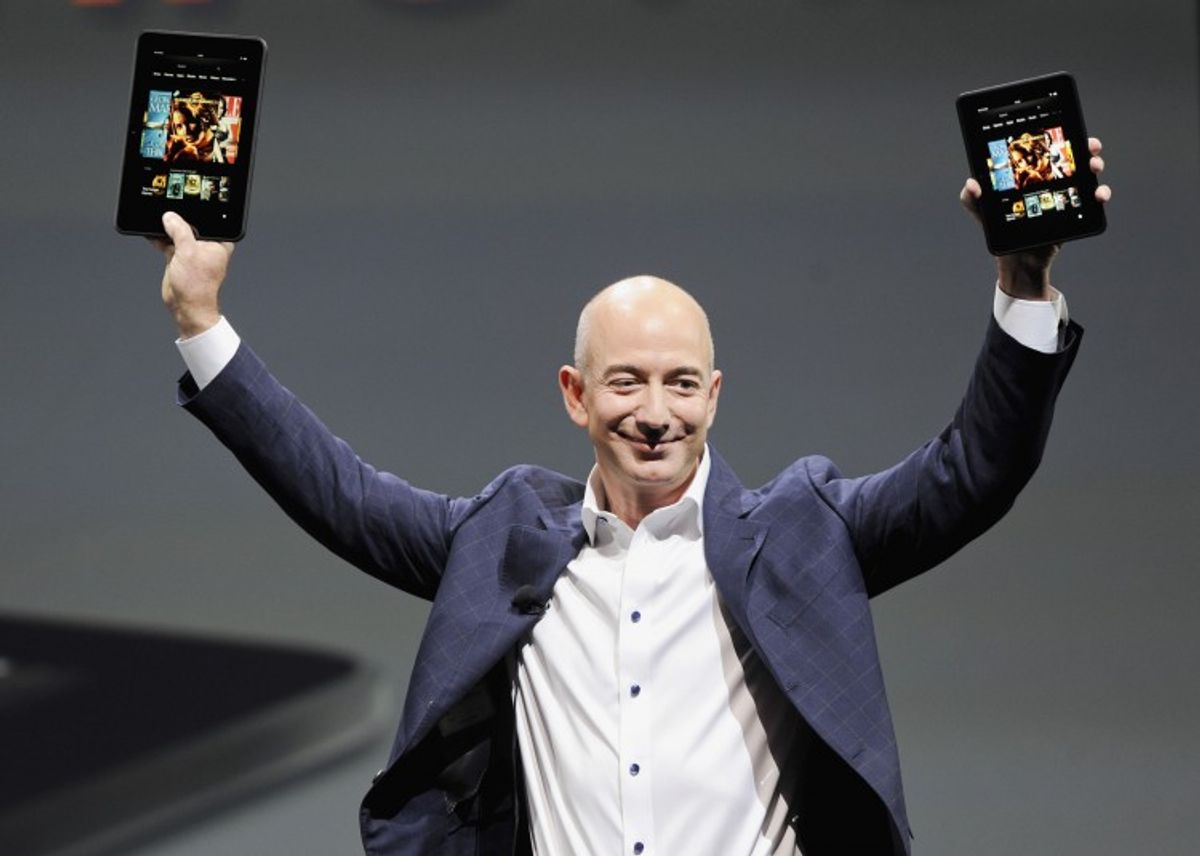Jeff Bezos, the billionaire founder of Amazon.com, has just bought the Washington Post. He spent less than 1 percent of his net worth on the venerable paper. For some reason he did not buy Slate or Foreign Policy. They remain owned by the Washington Post Co., which I assume will now be renamed something involving "Kaplan," after the test-prep and private education company that has for the last few years unethically kept the lights on at the world-famous newspaper.
In related news, the Boston Globe was just purchased by John Henry, billionaire owner of the Boston Red Sox and Liverpool Football Club. Henry made his fortune with a "hedge-fund-like" commodity trading firm. This is not necessarily bad news. As Andrew Leonard wrote yesterday: "Nothing protects a newspaper better than a benevolent dictator and his or her trust-fund-enjoying descendants."
The idea that the natural owner of a big city (or medium-size city!) newspaper is large, publicly traded corporations is a recent one, and frankly strange, for a newspaper's "job" is not to deliver value to shareholders, and, indeed, they have become quite bad at it, after a brief, flukey period in which they were good at it. A major newspaper's natural owner is a vain, hopefully benevolent person of means, just as smaller periodicals are best owned by eccentrics with printing presses and desires to spread a worldview, or simply to see their friends published. Bezos seems benevolent enough, for a rapacious modern billionaire. He did, of course, earn his fortune on the backs of ill-treated and under-compensated laborers, but what billionaire didn't? Better him than a Koch. For the employees of the Washington Post, better him than a Bloomberg, a man who runs his own media organization with the prim tyranny with which he has attempted to run New York City.
There is a lot of high-minded concern in the pages of the Post and everywhere else right now, from journalists worried that an Internet upstart may not care about the righteous mission of journalism. The media love writing about the media. Most normal people don't care, as the media critic learns anew each week when the Web traffic reports are issued.
In the face of indifference, the critics ask anyway: What does this mean for the Future of Journalism? Journalism is decidedly not saved, I can tell you that much. It's still pretty much doomed. In a sense the survival of the Washington Post should be a much lower priority, for righteous journalists, than the survival of the hundreds of smaller-market papers dead or dying as we speak. Washington is quite well covered, and will remain so as long as it is our nation's capital. It is the city halls and state legislatures of the hinterlands than grow more corrupt and extreme when the citizenry no longer stumble upon important local news on the road to the sports page. (Normal people used to read newspapers for comics, crosswords, classifieds, ballgame scores and and movie listings. Perhaps the strangest aspect of the slow death of the print newspaper is that the comics-allergic New York Times is the last national paper standing, though it does have a very good crossword.) It would be nicer to see Bezos rescue the New Orleans Times-Picayune, or have him free all the Gannett papers from their coldblooded corporate parents. The Post would've survived as a "brand" without his assistance. The Louisville Courier-Journal may not be so lucky.
But billionaires don't buy newspapers to run them as public goods, and smart billionaires don't buy newspapers to make money. Billionaires buy newspapers for influence. That is the point. The Post is among the most influential in the nation. Second- or third-most, depending on which party is in power. Buying the Washington Post is sort of like retaining the best-connected lobbyist in Washington, in a parallel world in which lobbyists are universally praised for their value to functioning democracies. Bezos needn't even exercise his influence in the vulgar fashion of a Murdoch. He can merely staff the paper with people attuned to his worldview and allow the opinion page to evolve to reflect his interests naturally. (And honestly, the interests of a rich "socially liberal" libertarian-leaning Democrat are already pretty well reflected by the Washington Post editorial page.)
The very reasonable fear isn't that Bezos will fire all the reporters -- he's a "long-term value" guy, not a cost-slashing Sam Zell -- but that Bezos will use his newly bought influence to lobby for federal policies that align with his financial interests. He does not particularly want to pay taxes, and he'd strongly prefer it if his cheap labor remained cheap, which is to say non-union.
When newspapers are only owned by the rich they rarely argue for the interests of the poor. But we already reached that point years ago, and a Bezos is probably no worse than a Graham or Weymouth, in the scheme of things.

Shares